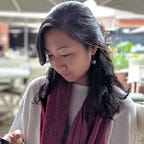Year of Discovery (Week 29: Dubai and Spiritual Cleansing)
This last week, I traveled to Dubai. I was invited to speak on ‘Education Reimagined’ at Expo 2020 for the launch of the Cartier’s Women’s Pavilion, so I spent my week exploring the city that rose from the dessert. I won’t claim to even scrape the surface of understanding the intricacies of Dubai’s social and political fabric but it’s yet another fascinating case study of a society that grew quickly in the last few decades.
What I appreciated the most this week are the various serendipities and incredibly inspiring people I met — from a Brazilian museum curator focused on social justice and giving a voice to indigenous tribes to an investor deeply curious about merging capital and profit with net positive impact in areas like mental health.
Today, I’m sharing reflections on Dubai and curanderismo.
Dubai
I’m incredibly grateful for the interesting conversations that this week has hosted—from sharing a panel with people who are thinking about education internationally to learning about how Dubai came to be what it is through the eyes and experiences of people who have lived here for 30+ years. While I can’t share most of my reflections from those conversations here without spending more time fact-checking and digging deeper underneath the surface, I thought I’d share some facts in general that helped me understand this city a bit better.
Size: Dubai is the size of Rhode Island and was once a pearl-fishing village, which is hard to believe given the massive skyscrapers and infrastructure today.
Economy: I was surprised to learn this, but most of Dubai’s GDP (over 95%) is non-oil-based. Oil has accounted for less than 1% of Dubai’s GDP and tourism to produce 20% of the GDP, hence world gatherings like Expo 2020. In 2018, Dubai welcomed 15.93 million visitors, retaining its ranking as the fourth most popular destination globally.
Demographics: The Dubai population is composed of just 15% native residents, with the remaining 85% being composed of expatriates. About 85% of the expatriate population — or 71% of the total population — is Asian, primarily from India (accounting for 51%).
Governance: The UAE is an authoritarian state under Mohammed bin Rashid Al Maktoum. The UAE has been described as a “tribal autocracy” where the seven constituent monarchies are led by tribal rulers in an autocratic fashion. There are no democratically elected institutions, and there is no formal commitment to free speech.
Sewage: While we drove out to the desert this week, I noticed a huge sand mountain. The driver pointed it out and shared that Dubai has no sewer system, so instead they use trucks to haul the entire cities’ excrement away. Because of the long queues and delays, some tanker drivers resort to illegally dumping the effluent into storm drains or behind dunes in the desert. This sand mountain happened to be one of the approved areas and it was shocking to me how enormous it is and how unsustainable this solution seemed.
Questions to reflect on:
- How else do you learn about a city when you travel?
- How has seeing different cities, towns and countries helped you understand your home better or where you want to call home?
Spiritual Cleansing: Curanderismo
In one of my chats this week about the Brazilian indigenous tribes, I learned about curanderismo, which is a diverse folk healing system of Latin America that holistically treats disorders through religious, spiritual, and health-related means. The three most common types of curanderos are the yerbero (herbalist), the partera (midwife), and the sobador (masseur).
Typically, the curandero works on three levels: the material, the spiritual, and the mental. He may prescribe a herbal remedy or conduct a religious ritual. Quite often, a practitioner is called upon to treat the physical symptoms that patients believe come from supernatural causes.
Learning about curanderismo reminded me of what I learned in global health on the tension between traditional medicine and biomedicine. Often the former treats patients holistically but is viewed by Western medicine as ‘unscientific’ while the latter is seen as ‘true science’ and clinical. Traditional medicine also comes from cultures that are more community-oriented over individualistic and rely on the wisdom of energy and nature. Back then, I distinctly remember feeling my American side arguing for an experimentally- and fact-based approach while my Eastern and Buddhist side feeling connected to holistic approaches, and I felt caught in between. Today, I find that we can’t have one without the other.
But learning about curanderismo this week took my thinking one step beyond health to examine it as a method that can be used to decolonize minds, bodies and spirits.
In “Curanderismo as Decolonization Therapy”, authors Dr. Ramon Del Castillo, Dr. Adriann Wycoff and Steven Cantu define decolonization therapy as “a healing process, a space where wounded spirits and souls from disenfranchised racial groups recover from historical trauma, racism, and other collective social ills caused by the long term negative effects of colonization.”
The authors argue that curanderismo can be a recognition and deconstruction of the multiple historical identities that are often used by the dominating culture as pseudo-schizophrenic states and split/dual personalities, causing consternation and self-hate.
But what does it mean when our world is becoming more and more secular and less and less religious and spiritual? Are we in fact taking away the tools that can support in the decolonization of our souls? Are we limiting our ability to deal with historical trauma? What else are we losing?
What I Want to Start Reading This Week: The Falling Sky: Words of a Yanomami Shaman
